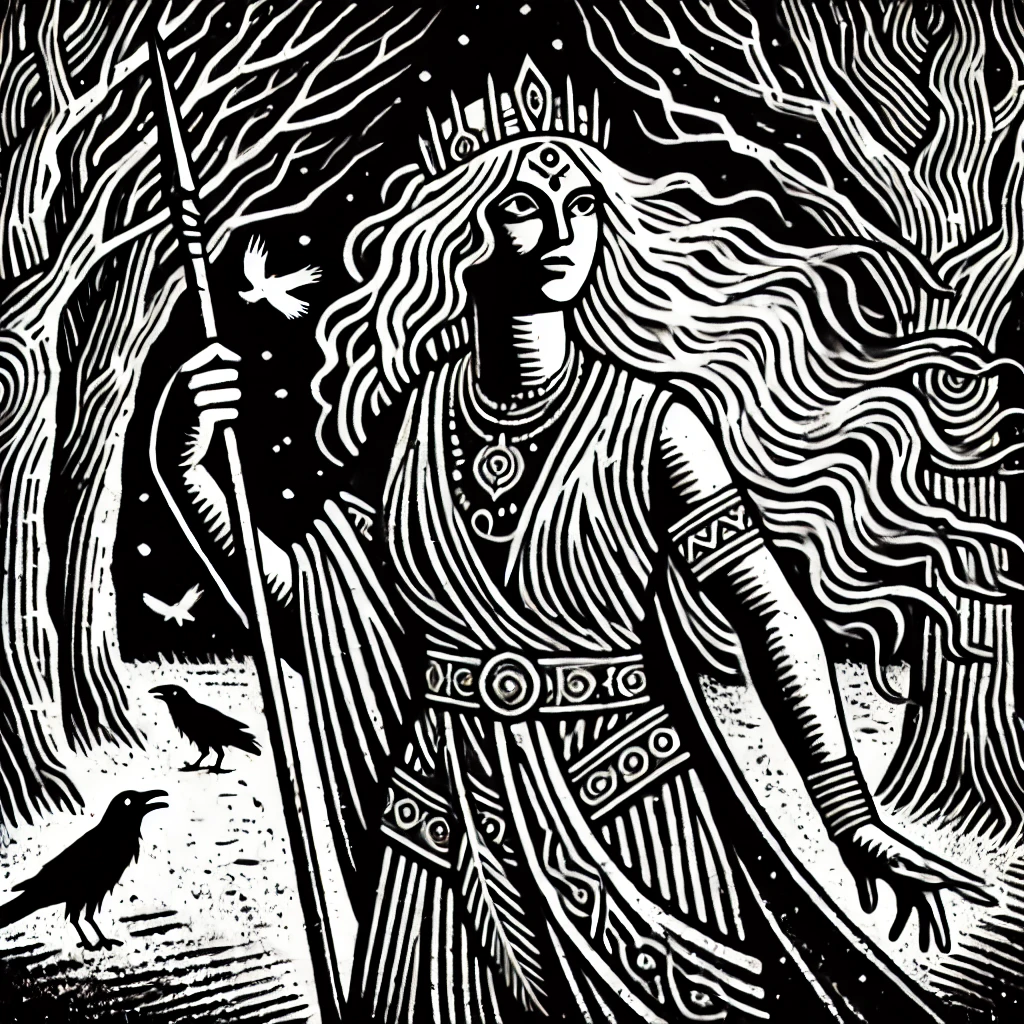
| Alternate Names: | Tentative: Baudihille (°Beaduhenna reconstructed OE) |
| Iconography: | Crow |
| Domains: | Protection, War, Magic, Death, Psychological Dominance |
Table of Contents
Historical Attestation
Baduhenna, a lesser-known war goddess mentioned by Tacitus in his Annals1White, M. E., & Walker, B. (1956). The Annals of Tacitus. Phoenix, 10(2), 80. https://doi.org/10.2307/1086443, was worshiped by the Frisii, an ancient North Sea Germanic tribe. Although her name only briefly surfaces in historical accounts, it offers clues about her role and significance within Frisian spirituality, particularly in the context of battle and psychological warfare.
The etymology of Baduhenna reveals much about her nature. Her name appears to be rooted in the Proto-Germanic badwa-, which translates to “battle” and is related to Old English beadu (meaning “battle” or “combat”). This root word parallels the Proto-Celtic bodwā-, from which the Irish war goddess Badb2https://en.wikipedia.org/wiki/Badb derives her name. Both goddesses are linked to warfare, with an emphasis on creating confusion and fear on the battlefield. The second element of Baduhenna’s name, -henna, is less clear but may be connected to the suffix -henae, which appears in the names of Germanic mother-goddesses, or Matronae. This suggests a protective aspect, perhaps positioning Baduhenna as a guardian of her people, particularly in times of war. The suffix -henna in Baduhenna’s name is a key part of understanding her identity, particularly in the context of Germanic goddesses. This element has often been associated with the names of the Matronae (plural Matronae or Matres), female deities commonly invoked in inscriptions from Roman and Germanic territories. The Matronae were revered as protective, nurturing goddesses who presided over fertility, childbirth, and domestic affairs, but they also held sway over aspects of war and protection.
The -henna suffix likely derives from a proto-Germanic or proto-Indo-European root related to women, protectresses, or powerful feminine figures. It can be compared to the ending -henae seen in the names of the Matronae on votive stones and altars from the 1st to 5th centuries CE in the Roman Empire. These inscriptions, found in regions like Germania Inferior, Gaul, and the Rhineland, honor protective mother-goddesses often depicted in triplicate, suggesting that this suffix could be tied to fertility, protection, and sovereignty in battle.
It is also worth mentioning Baudihille, a theonym, or divine name, which is inscribed on a dedication found along Hadrian’s Wall, which may denote a goddess associated with Mars Thingsus, the Romanized version of the Germanic god Tiw (or Týr). The name Baudihille seems to share etymological connections with war or battle, similar to Baduhenna and Badb, aligning her with a tradition of battle-associated deities. Given that the mercenaries stationed there were from the same region where the cult of Baduhenna is attested, it seems reasonable to tentatively assert that this inscription refers to the same goddess.
In terms of symbology, the accounts of Baduhenna’s sacred grove suggest a strong connection between the goddess and nature, particularly the wild and untamed forests where divine forces were believed to dwell. Groves were often revered as sacred places in Germanic and wider Indo-European spiritual traditions, representing liminal spaces where the divine and mortal worlds intersect. Baduhenna’s grove, the site of a massacre in 28 CE, symbolizes a place of power where the boundaries between order and chaos blur. The grove served as the setting for an ambush in which 900 Roman soldiers were killed by the Frisii. The chaos that ensued among the Roman forces—where soldiers reportedly turned on each other—suggests that Baduhenna’s influence may have extended beyond physical warfare into the psychological domain.
This psychological manipulation parallels the powers3https://symbolsage.com/badb-celtic-war-goddess/ of the Irish war goddess Badb, who is similarly associated with confusion and terror on the battlefield. In Celtic tradition, Badb often takes the form of a crow, appearing before or during battle to stir fear and chaos among enemy soldiers. Her power lies in turning the tide of battle through mental warfare, creating an environment of confusion and disorder. This is echoed in the aftermath of the Battle of Baduhenna’s Wood, where the Roman soldiers, disoriented and panicked, descended into chaos, leading to their ultimate destruction. Baduhenna’s ability to incite confusion aligns her with deities like Badb, whose powers transcend physical combat and influence the psychological state of warriors.
The thematic overlap between Baduhenna and Badb suggests that they may be reflexes of a shared Proto-Indo-European war goddess archetype. Both are associated with battle, confusion, and death, and both wield power over the minds of warriors. While Badb operates in the form of a crow in Celtic myth, Baduhenna’s influence is more subtle, tied to the sacred space of her grove, where confusion and betrayal manifest in the actions of those who enter. This conceptual link is strengthened by the etymological connections between the Proto-Celtic bodwā- and the Proto-Germanic badwa-, both meaning “battle” or “warfare,” emphasizing their shared Indo-European heritage
Ingwine Guidance
For modern North Sea Germanic pagans, Baduhenna represents an important, though often overlooked, aspect of the divine in battle. While figures like Woden and Tiwaz might be seen as gods of direct combat, Baduhenna governs the less tangible, but equally decisive, realm of psychological warfare. Her presence can be invoked not only for victory in physical conflict but also for the ability to disorient and outmaneuver adversaries through strategy and cunning. By reconstructing her role alongside other Germanic and Indo-European deities, practitioners can reconnect with a goddess whose influence shaped the fate of warriors long ago.
In this way, Baduhenna stands as a reminder that not all battles are fought with swords and spears—some are won in the minds of those who fight.
